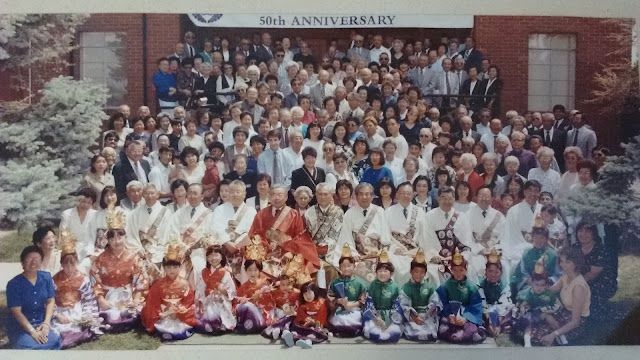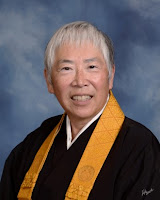
The Future of IOBT---5 Things!
At IOBT, we are getting busy thinking about all the fun conversations and discussions we will be having at our75th NW Buddhist Convention in September. Part of the convention theme is “Looking to the Future,” and one of the things we want to focus on is how our temples can share the Buddha Dharma (Teachings of the Buddha) in the 21st Century.
Here is a photo from our 50th Anniversary 25 years ago! A lot has changed since then. What will the next 25 years bring us?
What can we do to help share the Buddhist Teachings with the next generation? One suggestion that stuck in my mind was developing five things that we would want to share with newcomers about the Teachings/Dharma.
Those of you who grew up in the temple like I did will understand the feeling of inadequacy when questioned, “What is Buddhism?” or “What do Buddhists believe?” Attending Northwest Nazarene College (now NNU) in the 70s, I was often faced with questions. Even though I had attended temple services and classes since my childhood, it was difficult trying to answer the questions. Growing up in a temple where Japanese was the primary language of the resident ministers, I did not have a clear understanding of Amida Buddha, the Nembutsu, Shinjin, or the Pure Land. And now, even though I am an ordained Buddhist priest in the Jodo Shinshu Hongwanji-ha tradition, I still struggle to find the right way to share our Teachings.
I want to challenge myself--and all of you--to think about what you would want to share about your understanding of the Buddhist Teachings. Here are five things that I have come up with:
- Buddhism teaches impermanence. Everything changes. Nothing stays the same. Any discomfort/suffering we encounter in life will not last. However, we might feel that impermanence is negative because we are unable hold on to anyone or anything that we hold dear. The negative can become a positive when we finally realize that because of impermanence we must enjoy each precious moment that we are given. This moment in time will never occur again.
- Buddhism teaches interdependence. Many of you have heard the phrase “It takes a village to raise a child.” I want revise that to: “It takes a global village to nurture a human being.” If we learned anything from the pandemic, we know that nothing exists by itself. We are all interconnected and interrelated. Many causes and conditions influence my life, and my actions create causes and conditions for others.
- When we are aware of interdependence and all the causes and conditions that make our lives possible, we feel great humility. I should not boast of MY achievements because they are not my own. I cannot say that I became a Buddhist priest. I was privileged to become a priest because of the support of the temple Sangha, my grandparents, my parents, numerous teachers, and friends.
- The humility that we feel leads to gratitude. The Buddhist Churches of America focuses on Shin Buddhism as a life of gratitude. We should be grateful for our lives and then try to live the best lives that we can to show our appreciation.
- We shouldn’t take ourselves too seriously. We know that we are foolish beings (bonbu), and we will make mistakes. We will stumble and fall. As Shin Buddhists, we can smile when we reflect on any difficult situation that exposed our foolishness, realizing that it wasn’t the first time and it won't be the last.
Those are my thoughts on what I would like people to know about Buddhism as I understand it. What are your thoughts on this topic? Consider your own life and how you apply Buddhist Teachings to your day-to-day life. The future of Buddhism is in our ability to share Teachings with others. If you would like to share your ideas, comment on this post, or send them to
NAMO AMIDA BUTSU
In Gassho,
Rev. Kathy Chatterton (Assistant Minister)



